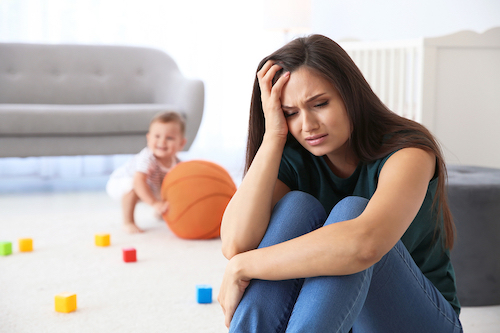 Children who blame themselves for their mothers being unhappy are more likely to experience depression and anxiety.
Children who blame themselves for their mothers being unhappy are more likely to experience depression and anxiety.
A study led by Southern Methodist University family psychologist Chrystyna Kouros found that although mothers who had higher levels of depressive symptoms may have an increased risk their children will experience depression and anxiety, this isn’t the case for all kids with depressed mothers.
“Children of depressed mothers are 2-3 times more likely to develop depressive symptoms themselves; but there are many children who go on to live healthy lives. We were interested in understanding which children are most vulnerable to developing depression in the context of having a mother with depressive symptoms,” Kouros told Theravive.
“We found that children who blamed themselves more for their mother's sadness and depressed symptoms… had higher levels of internalizing symptoms (this is a composite of both depression and anxiety symptoms) compared to children who had lower levels of these types of appraisals. This was true regardless of whether we used children's self-reports of their internalizing symptoms or mothers' reports of their child's internalizing symptoms, and controlling for how depressed mothers self-reported they were.”
In undertaking the research, Kouros and her colleagues recruited 129 mothers and their children in the community of Dallas-Fort Worth. The average age of children in the study was 13.
The mothers were asked to complete a survey that asked them to agree or disagree with statements like ‘I can’t shake the blues’ and ‘I lost interest in usual activities’. This enabled researches to assess whether the women had any depressive symptoms, even if they had not received a diagnosis of depression. They found that almost 12 per cent of the mothers surveyed had potential clinical levels of symptoms of depression.
The mothers who were surveyed were also asked whether they felt their children had any symptoms of depression or anxiety.
The children completed four surveys of their own to determine if they were experiencing symptoms of depression or anxiety, or if they blamed themselves for any depressive symptoms in their mothers.
“Some children blame themselves and think it's their fault when they see that their mother is sad. These children are at greater risk for developing depression and anxiety symptoms themselves. Hopefully, opening talking about feelings and emotion in families can correct some of these misconceptions,” Kouros told Theravive.
“Everyone feels sad or down some days and that is normal. Talking about these feelings can help children understand that everyone feels this way and these feelings (for most) do pass. Talking about feelings and emotions, and how your day was, can also let children know why someone is feeling a certain way so they don't mistakenly assume it's their fault. Open communication can also allow families to "catch" any comments that children make that imply they blame themselves and correct those misconceptions. “
The researchers argue there are two possible explanations for the link between a mother’s depressive symptoms, and her children experiencing similar issues. A child who blames themselves for their mother’s symptoms, Kouros says, is more likely to brood about why their mother feels this way. The literature shows that rumination over things that cause stress, and particularly things that are uncontrollable, can be associated with depression and anxiety.
If children feel responsible for their mother being sad, they may be more likely to try and improve things using ineffective coping strategies. This in turn may lead to a sense of failure, low self-worth and a feeling of helplessness in children.
Kouros hopes to broaden the research to see whether similar results could be found in fathers and children.
“We need to replicate this study since this is the first study to test children's self-blame attributions and there are some limitations of this study (such as a relatively small sample of 129 mothers and children, and we used a community sample so there were not that many mothers who had clinical levels of depression). Second, it's also important to study these questions for father-child pairs, as well,” she told Theravive.
“The good news about the findings is that negative thinking patterns (like self-blame appraisals) are something that is modifiable. That means, this is a potential risk factor that we can be changed with preventive interventions.”
Elizabeth Pratt is a medical journalist and producer. Her work has appeared on Healthline, The Huffington Post, Fox News, The Australian Broadcasting Corporation, The Sydney Morning Herald, News.com.au, Escape, The Cusp and Skyscanner. You can read more of her articles here. Or learn more about Elizabeth and contact her via her LinkedIn and Twitter profiles.